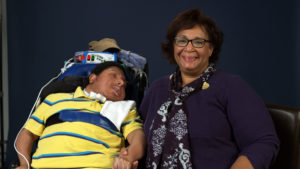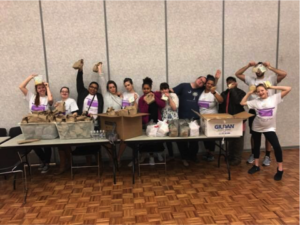This is a new series at The Arc Blog called #HandsOff. Each month, we will feature a story from individuals and families across The Arc’s network about how some of today’s key policy issues impact their day to day lives.
By: Debbi Harris
As we celebrate the 25th anniversary of the Family and Medical Leave Act (FMLA), I am compelled to reflect on the early and difficult birth of our son, Joshua, and the challenges that my family and I faced in securing the leave we needed to care for him. The FMLA allows covered employees to take up to 12 weeks of unpaid leave for certain family and medical reasons, generally with a guarantee to keep their job and benefits afterward. This Act has been invaluable for many people with disabilities and their families – and as you’ll learn from my story, its protections can sometimes mean the difference between the life and death of a loved one.

Josh and Debbi
Photo by Jerry Smith
Josh was born in January of 1993, about 8 weeks before he was due. Complications immediately prior to and during labor led to an emergency C-section. With my husband Victor by my side, we learned upon his delivery that Josh had experienced a grade IV brain hemorrhage in utero, and had suffered from anoxia and hydrocephalus at birth as a result. The next few months in the NICU became a rollercoaster of medical ups and downs, as doctors tried to stabilize Joshua’s initial condition, while, at the same time, treat the morbidities that come with prematurity, along with the unanticipated medical effects of what would later emerge as Joshua’s disabilities.
At the time, I was working full-time as a technical writer and Victor was a full-time applications developer, under contract. We didn’t qualify for any financial supports and were unfamiliar with programs like Medicaid – but we were able to rely on the private insurance I received through my employer to provide Josh’s life-sustaining medical care. We also already had two children at home, making it imperative that both of us remain in our jobs to earn enough to support them, as well.
In the first year of his life, Josh had 10 surgeries and as many Pediatric Intensive Care Unit (PICU) hospitalizations for respiratory and shunt infections. Victor and I tried our best to juggle our jobs with daycare, Kindergarten, and Victor’s duties in the U.S. Marine Corps Reserve, all while bearing the anxiety and sadness of watching our youngest son go through this terrible ordeal. We spent countless days and nights at the hospital, often bringing our other boys along and letting them play with their toys underneath the giant metal PICU crib that held their little brother.
Despite the new stresses in our lives, I was determined to make up for any lost time at work and to meet my professional obligations. I never missed a deadline, even if that meant reporting to the office late at night and staying until the early hours of morning. It was exceedingly difficult. Still, my supervisors lacked compassion for our situation, and I feared what the loss of my job would mean for Josh – if we were to lose the health insurance that was, in those very moments, sustaining his life.
Fortunately, about a month after Josh was born – February 5, 1993 – the FMLA had become law. With the pressures at work mounting, and Joshua’s medical outcomes becoming less clear, I knew the FMLA would be my family’s last recourse to getting the time we needed to support our son.
At the time, the FMLA was new and awareness about the law was often low, including at my company. As I began to explore how to request time off through the FMLA, it became apparent very quickly that I would receive little to no support from my corporation in my decision. Even more shocking, my boss and some of my colleagues were openly critical of my need to take that time, implying that my son’s condition would simply create a lasting burden for the organization. Lack of knowledge created unwarranted fears and tension. My hope was only to have the time and resources to keep my son alive, and to give him the opportunity to thrive. Our family’s experience with Josh was a clear example of the need for the law.
Thankfully, I was ultimately able to use FMLA leave – but only after being required by my employer to first use up all of my vacation, sick time, and long- and short-term disability. Afterwards, when Josh was perhaps a year old the FMLA protected me from losing my job and our health insurance, meaning that Josh could continue to receive his vital medical care.
Josh’s needs were still critical when he first came home from the hospital at almost four months old. He was technology-dependent, needed constant skilled nursing assessment, and was discharged on ‘in lieu of hospitalization’ status. While he was prescribed home care nursing, it was difficult to find consistent, trained home care nurses, which forced me to decrease my hours to half-time and, ultimately, to work from home two days a week. After a trying period, my husband secured a job that provided us with benefits and enough income to support our family, which allowed me to resign from my job to care of our children full-time.
Without the protections offered by the FMLA, I cannot say whether Josh would still be with us – which is why I am grateful for the protections it offered us and why I will continue to speak out in support of its policies. As I reflect on our experience in fighting for leave in the months and years after Josh’s birth, I cannot help but think of how different our situation would have been if we were allowed paid family leave. The FMLA gives families like ours a chance to take care of their loved ones without bearing the repercussions of losing out on employment or health insurance. As the FMLA enters its 25th year, I believe that the next step – paid leave – should be a protected right of all working individuals.


 The Arc of South Carolina was awarded a 2017 MLK Day of Service* grant to provide food to members of the local community in need. The chapter decided to focus its activities in Lexington and Richland Counties, which continue to suffer from a lack of access to food and high levels of poverty since a flood in 2015.
The Arc of South Carolina was awarded a 2017 MLK Day of Service* grant to provide food to members of the local community in need. The chapter decided to focus its activities in Lexington and Richland Counties, which continue to suffer from a lack of access to food and high levels of poverty since a flood in 2015.






